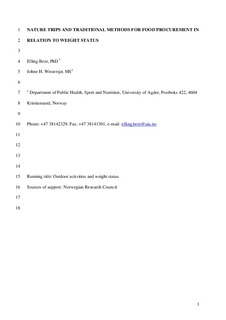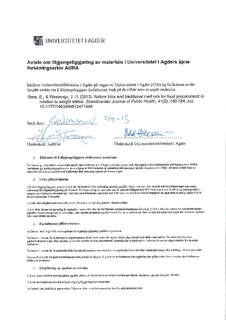| dc.contributor.author | Bere, Elling | |
| dc.contributor.author | Westersjø, Johne H. | |
| dc.date.accessioned | 2013-05-08T07:59:53Z | |
| dc.date.available | 2013-05-08T07:59:53Z | |
| dc.date.issued | 2013 | |
| dc.identifier.citation | Bere, E., & Westersjo, J. H. (2013). Nature trips and traditional methods for food procurement in relation to weight status. Scandinavian Journal of Public Health, 41(2), 180-184. doi: 10.1177/1403494812471446 | no_NO |
| dc.identifier.issn | 1403-4948 | |
| dc.identifier.uri | http://hdl.handle.net/11250/139063 | |
| dc.description | Author's version of an article in the journal: Scandinavian Journal of Public Health. Also available from the publisher at: http://dx.doi.org/10.1177/1403494812471446 | no_NO |
| dc.description.abstract | Aims: The purpose of this study is to assess the relationships between trips in nature, gathering of wild plants, fishing and hunting and weight status. Methods: Data from a cross-sectional questionnaire survey of 996 parents of sixth- and seventh-graders from 38 randomly chosen schools in two Norwegian counties. All data are self-reported: Weight and height (participants were considered as overweight if BMI were 25 or higher), family trips in nature (dichotomized into ayenonce a week vs. less than once a week), gathering of wild plants/mushrooms, fishing and hunting (all dichotomized into ayensometimes vs. never), sex, family education level and general physical activity level. Multivariate logistic regression analyses were performed with overweight as the dependent variable Results: Adjusting for all outdoor activities; those engaging in nature trips (OR = 0.52; 95% CI = 0.37-0.75) and those engaging in gathering (OR = 0.73; 95% CI = 0.55-0.98) were less frequently overweight, while those fishing (OR = 1.83; 95% CI = 1.35-2.47) were more frequently overweight. After also adjusting for sex, family education level and general physical activity level, nature trips (OR = 0.52; 95% CI = 0.36-0.75) and fishing (OR = 1.53; 95% CI = 1.12-2.10) were still significant, gathering was not. No association between hunting and weight status was observed. Conclusion: Frequent family trips in nature might be an important behaviour in order to reverse the obesity epidemic. | no_NO |
| dc.language.iso | eng | no_NO |
| dc.publisher | Sage Publications | no_NO |
| dc.subject | outdoor activities | no_NO |
| dc.subject | hiking | no_NO |
| dc.subject | gathering | no_NO |
| dc.subject | overweight | no_NO |
| dc.subject | obesity | no_NO |
| dc.title | Nature trips and traditional methods for food procurement in relation to weight status | no_NO |
| dc.type | Journal article | no_NO |
| dc.type | Peer reviewed | no_NO |
| dc.subject.nsi | VDP::Medical disciplines: 700::Health sciences: 800 | no_NO |
| dc.source.pagenumber | 180-184 | no_NO |
| dc.source.volume | 41 | no_NO |
| dc.source.journal | Scandinavian Journal of Public Health | no_NO |
| dc.source.issue | 2 | no_NO |
| dc.identifier.doi | 10.1177/1403494812471446 | |

